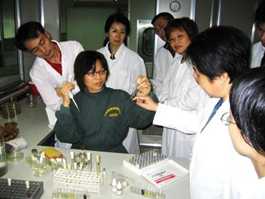Foodborne disease in China - Physician behavior change helps both patients and public health

“My patients are happy when I tell them that they do not need take antibiotics because they are not infected by certain bacteria. They feel that they have been properly treated” physician, Shanghai United Family Hospital
IN CHINA PHYSICIANS OFTEN PRESCRIBE ANTIBIOTICS WITHOUT CONDUCTING PROPER LABORATORY TESTS. “Testing often does not give positive results and it takes time, so I would rather treat my patients rather than wait for nothing,” said one physician from a general hospital in Guangdong. Unfortunately, this reflects the view of many physicians. To further complicate the issue, microbiologists in hospitals do not see the value of testing cultures to help physicians provide proper treatment. Such diagnosis and treatment without laboratory evidence can increase the abuse of antibiotics and can have serious implications on antibiotic resistance.
THE GOALS OF THE US CDC COLLABORATION IN FOODBORNE DISEASE are to change physicians’ behavior and to help the patients get proper medical care. The program helps optimize clinical laboratory testing procedures to speed up turn-around times and to increase the positive rate of testing. To emphasize the importance of the laboratory testing in guiding their proper treatment, the program provides training courses to physicians. The program works with a series of sentinel hospitals in several provinces, e.g., Guangdong, Shanghai, and Henan. In these hospitals physicians are encouraged to order cultures for patients with diarrhea before they decide to prescribe medication. After working with this protocol, the physicians could see the benefit of prescribing treatment according to the laboratory results. For example, if the laboratory results showed a viral infection, no antibiotics are needed; if a bacterial pathogen is found, appropriate antibiotics should be prescribed. “My patients are happy when I tell them that they do not need take antibiotics because they are not infected by certain bacteria. They feel that they have been properly treated,” explained a physician from Shanghai United Family Hospital. “This makes me order cultures more frequently as I know it can help!” The trust from doctors has also had a positive impact among microbiologists. This has strengthened the working relationship between clinicians and microbiologists.
IMPROVED PRACTICE HAS BENEFITTED PUBLIC HEALTH. When cultures are ordered by physician, laboratories send pathogen strains to public health laboratories for further subtyping. This analysis allows the public health system to identify possible outbreaks. Several foodborne outbreaks have been detected through such networks. This would not have been possible without physician-ordered laboratory tests. Changing physicians’ behaviors in terms of patient testing may seem like a small step, but it has greatly helped both individual patients as well as the public’s health.
- Page last reviewed: December 5, 2013
- Page last updated: December 5, 2013
- Content source:
Global Health
Notice: Linking to a non-federal site does not constitute an endorsement by HHS, CDC or any of its employees of the sponsors or the information and products presented on the site.


 ShareCompartir
ShareCompartir